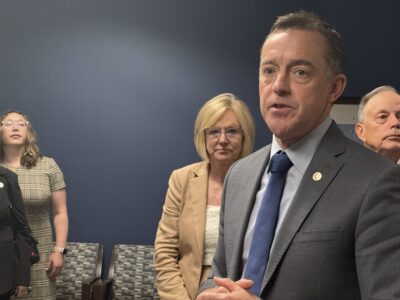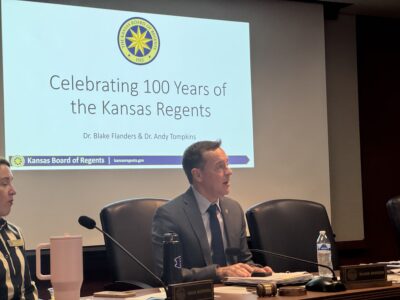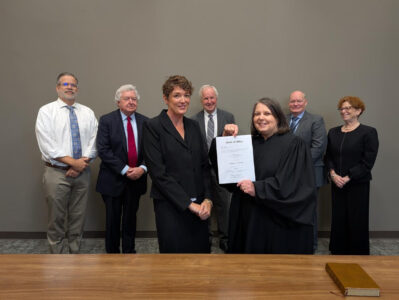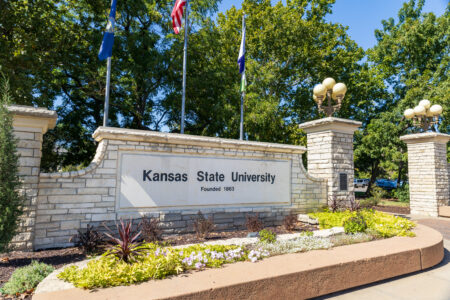Girod, other higher ed leaders testify against bill that would weaken faculty tenure protections

photo by: Tim Carpenter/Kansas Reflector
OLYMPUS DIGITAL CAMERA
TOPEKA — Academic leaders of the University of Kansas and Kansas State University said Tuesday legislation retroactively abolishing property rights inherent in tenure would run off distinguished educators, undercut faculty recruiting, destroy research programs, trigger an exodus of students and deliver a devastating blow to the state’s economy.
KU Chancellor Doug Girod and KSU President Richard Linton testified against a Kansas House tenure reform bill despite issuance of what the chief of staff to Democratic Gov. Laura Kelly characterized as a threat from Senate Republicans that state university budgets would be slashed if academic leaders spoke out against House Bill 2348.
“Eliminating or weakening tenure in Kansas would create an immediate and severe competitive disadvantage for our universities,” Girod said. “Top researchers and educators would choose institutions in other states where tenure protections remain strong, while our current faculty would receive compelling offers to leave.”
He said the value of tenure, in terms of recruiting and retaining faculty, contributed to an environment that attracted $546 million annually in research funding to KU. The House legislation placed in jeopardy KU’s $8 billion annual economic impact to the state, the chancellor said, or an amount more than the gross revenue of all but one Kansas company.
Linton, who heads the state’s land-grant university in Manhattan, said debasing tenure so it no longer carried a property right would hit hardest at the university’s cutting-edge research in animal health and food safety.
“We already face challenges convincing young people and innovative companies to build their futures here,” Linton said. “Weakening our universities by dismantling tenure would only make Kansas less appealing to the industries and workforce we need to grow our economy.”
Steven Lovett, an Emporia State University attorney and author of the bill undermining faculty tenure at 32 Kansas public higher education institutions, outlined reasons for introducing the bill in the Kansas House.
Steven Lovett, an Emporia State University attorney and author of the bill undermining faculty tenure at 32 Kansas public higher education institutions, outlined reasons for introducing the bill in the Kansas House. He said property rights tied to tenure were unnecessary to preserve academic freedom. (Tim Carpenter/Kansas Reflector)
Darth Vader and tenure
The bill was introduced at the behest of Emporia State University attorney Steven Lovett, who was the lone advocate for the measure during the House Judiciary Committee meeting.
Lovett, a defendant in a federal lawsuit filed against ESU by a group of tenured faculty who were fired in 2022, quipped at the outset that drafting and advocating for the bill had taken him from obscurity to something of a Darth Vader character.
In a strange plot twist, Lovett confirmed he developed the two-page bill in his personal capacity rather than at the direction of his boss ESU President Ken Hush or anyone else.
Lovett said the First Amendment to the U.S. Constitution was sufficient to protect academic freedom in higher education.
“Public universities are encumbered financially and culturally by the unnecessary impediment of tenure as a property right,” he said. “One of the great fallacies obstructing necessary change in higher education is that academic freedom is preserved and protected by tenure and due process when, in fact, it is protected by the First Amendment.”
Lovett’s microphone-drop moment came at the conclusion of his testimony spelling out arguments for abolishing the property right of tenure.
“For what it’s worth, I’m going to take the opportunity in this public forum, in this space, on my own, voluntarily, to renounced and surrender the tenure that I was awarded by Emporia State University,” said Lovett, who holds the rank of associate professor. “Tenure should be a badge of meritorious work and service, and not a personal right paid for by my neighbors and my fellow Kansans.”
In 2023, there were 2,830 tenured or tenure-track faculty at KU, KSU, ESU, Wichita State University, Fort Hays State University and Pittsburg State University.
Blake Flanders, president and CEO of the Kansas Board of Regents, said the nine-member board providing oversight of state universities was opposed to the House bill. He also said Board of Regents policy required legislative proposals from institutions in the state higher education system, including ESU, to be approved by the Board of Regents prior to being submitted to the Legislature.
“That policy was not adhered to in the case of this bill,” Flanders said. “If improvements are needed in the current structure, the board looks forward to working with the Legislature and being engaged early in the process.”
In 2022, ESU dismissed 30 tenured or tenure-track faculty under a policy adopted by the state Board of Regents. Eleven of the dismissed faculty filed a lawsuit in U.S. District Court. In court rulings, a federal judge pointed to the property right associated with tenure at Kansas Board of Regents institutions while allowing the case to proceed. The attempt to strip tenure of a property right has been viewed as potentially helpful in ESU’s legal fights in state and federal court.
Resounding dissent
Students, faculty, higher education associations and labor leaders objected to the bill aimed at 32 public universities, community colleges and technical colleges located throughout Kansas.
Norman Philipp, a Pittsburg State professor and chair of the state university Council of Faculty Senate Presidents, said the Legislature’s intrusion into tenure was “unnecessary, unfounded and damaging.”
He said members of the Legislature ought to reject the bill and work on strengthening each university’s ability to develop world-class faculty.
“Academic excellence depends on a robust tenure system that ensures accountability while maintaining the security and freedom necessary for scholarly achievement,” Philipp said.
Washburn University student body president George Burdick said the legislation was ill-advised because implementation would undermine the college experience and academic preparedness of students.
He agreed with a statement of opposition endorsed by student body presidents at the six state universities. It called on legislators to maintain academic freedom on public university and college campuses in Kansas by deflecting the bill.
• Tim Carpenter is a reporter with the Topeka-based news service Kansas Reflector.







